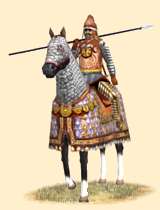Pushtîghbânê Shâhigân-î Pahlavânîg (Parthian Late Bodyguard Cavalry)
 |
Weapons | Defence | Mental | ||||||
|---|---|---|---|---|---|---|---|---|---|
| Primary | Secondary | Armour: | 26 | Morale: | 18 | ||||
| Type: | spear | sword | Shield: | 0 | Discipline: | disciplined | |||
| Attack: | 5 | 11 | Skill: | 10 | Training: | highly_trained | |||
| Charge: | 47 | 28 | Recruitment | Other | |||||
| Lethality: | 0.4 | 0.225 | Soldiers: | 10 | Hit Points: | 1 | |||
| Range: | 0 | 0 | Cost: | 2583 | Mass: | 1 | |||
| Ammo: | 0 | 0 | Upkeep: | 0 | |||||
| Turns: | 1 | ||||||||

The elite bodyguard of every Parthian lord is composed of the finest young men and their war gear among the finest to be found. They are loyal unto death.
Elite
Disciplined
Hardy
These are the best of the best Parthian horsemen, hand picked by the Parthian General as his personal guard. These are the men that in Parthian armies are expected to deliver the crushing blow that brings victory, and even elite infantry will think twice before standing up to their ground-shaking charge. While limited in number, they are very effective due to the discipline and superior equipment They are eager to prove their worth to their king, thereby gaining glory, wealth and renown. They would have large flat golden collars around their necks, marking them as nobles. They are mounted on the excellent Nisean horses, strong enough to carry these heavily armoured riders, surpassing even other Cataphracts. They are extremely loyal, a somewhat rare occurrence in Parthia due to clan infighting between the nine tribes.
Historically, only the king, great nobles and their dependents could afford such tremendously expensive equipment and a horse capable of carrying it easily, so it is not surprising that the clothing of these men was richly coloured and ornately embroidered. These great landowners were directly subordinate to the clan princes of the seven great clans of Parthia. Asavaran nobles had feudal obligations and were expected to provide themselves and a predetermined number of retainers for service in the army of their overlord. The size of this retinue was usually determined by the amount of land held.